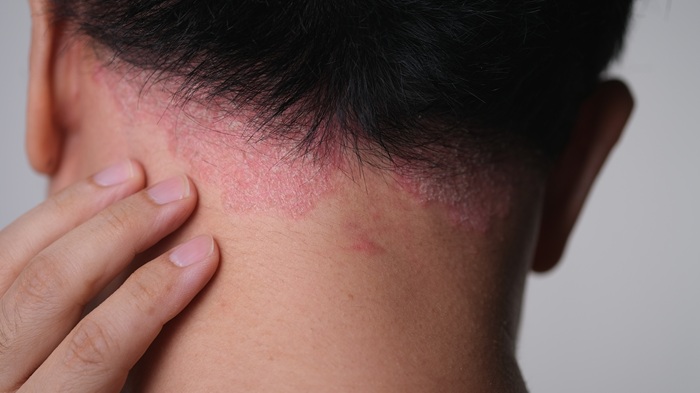Scalp psoriasis is a chronic autoimmune condition that causes flaky, silvery patches to form on the scalp. Common symptoms include red, scaly patches and itching. The causes of scalp psoriasis are linked to immune system dysfunction and genetic factors. While there is no cure, treatment options such as topical treatments, phototherapy, and systemic medication can manage symptoms. Early diagnosis and professional care are essential for effective treatment and relief.

Scalp Psoriasis is a form of psoriasis that primarily affects the scalp, causing red, inflamed, and scaly patches of skin. It is a chronic condition that falls under the umbrella of autoimmune disorders, meaning it occurs when the body’s immune system mistakenly attacks healthy skin cells. This leads to rapid skin cell turnover and the formation of patches or plaques on the scalp. These plaques are often covered with silvery scales, which are characteristic of plaque psoriasis, the most common type of psoriasis.
Scalp psoriasis can affect any part of the scalp, from the hairline to the back of the neck, and even behind the ears. Though it is not contagious, it can cause significant discomfort and affect one’s self-esteem due to the visible nature of the condition.
The scalp psoriasis symptoms can vary in severity, ranging from mild irritation to extensive plaque formation. Here are the most common symptoms:
For those with scalp psoriasis, the condition can cause noticeable hair thinning or hair loss in affected areas due to the inflammation and frequent scratching.
The exact psoriasis scalp causes are not fully understood, but several factors contribute to its development:
To diagnose scalp psoriasis, a dermatologist typically performs a thorough physical examination of the scalp. The doctor may ask about your medical history, symptoms, and any family history of psoriasis or other autoimmune conditions. In some cases, a skin biopsy may be performed to confirm the diagnosis and rule out other conditions with similar symptoms.
A dermatologist in Bangalore or other locations may also use special tools like a Wood’s lamp to help examine the scalp under ultraviolet light, which can enhance the visibility of certain types of psoriasis.
While scalp psoriasis treatment cannot cure the condition, there are various approaches to manage symptoms and improve quality of life:
Light therapy or phototherapy involves exposing the scalp to ultraviolet (UV) light under controlled conditions. This can help slow the rapid skin cell turnover and reduce inflammation. UVB therapy is commonly used for scalp psoriasis.
In cases of severe scalp psoriasis, oral or injectable medications may be prescribed. These treatments aim to target the immune system and slow down the inflammatory process. Medications include biologics (which target specific immune cells) and methotrexate.
Regular gentle washing with a non-irritating shampoo can help keep the scalp clean and reduce scaling. Avoiding harsh hair care products can also prevent flare-ups.
Some individuals find relief from scalp psoriasis through natural remedies like aloe vera, apple cider vinegar, or tea tree oil. However, it’s important to use these with care and consult a doctor before trying them, as they may not work for everyone and could cause irritation in some cases.
While it is impossible to completely prevent scalp psoriasis, the following measures can help reduce the frequency and severity of flare-ups:
If your symptoms worsen or the psoriasis on your scalp becomes painful or significantly impacts your daily life, it’s time to consult a professional. Visit SPARSH, a dermatology hospital in Bangalore, where you can get expert diagnosis and personalised treatment plans. Early intervention is crucial to managing the condition and preventing complications like hair loss or infections.
Scalp psoriasis can be a frustrating and chronic condition, but with the right treatment and care, symptoms can be managed effectively. Recognising the symptoms early, understanding the causes, and exploring treatment options are essential for managing the condition. Whether through topical treatments, phototherapy, or systemic medications, there are several ways to manage scalp psoriasis. If you experience persistent symptoms, consulting a dermatologist for tailored care is essential to improve your scalp health and overall well-being.
The primary cause of scalp psoriasis is an overactive immune system that triggers rapid skin cell turnover. Genetic factors also play a significant role.
The best treatment for plaque psoriasis on the scalp typically includes topical steroids, coal tar shampoos, and vitamin D analogues. In severe cases, systemic treatments or phototherapy may be recommended.
Treatment options for removing psoriasis plaque include the use of topical treatments like steroids or coal tar, as well as light therapy to reduce the buildup of skin cells.
The root cause of plaque psoriasis is an autoimmune response that accelerates skin cell turnover, leading to the formation of thick, scaly plaques. Genetic factors and environmental triggers are known to contribute to its development.
Categories: Dermatology
Scalp Psoriasis: Symptoms, Plaque, Causes & Treatment is available for appointments. Please fill the below form to book an appointment.
Unlock the door to exceptional healthcare, book an appointment with SPARSH Hospital and let your journey to wellness begin.